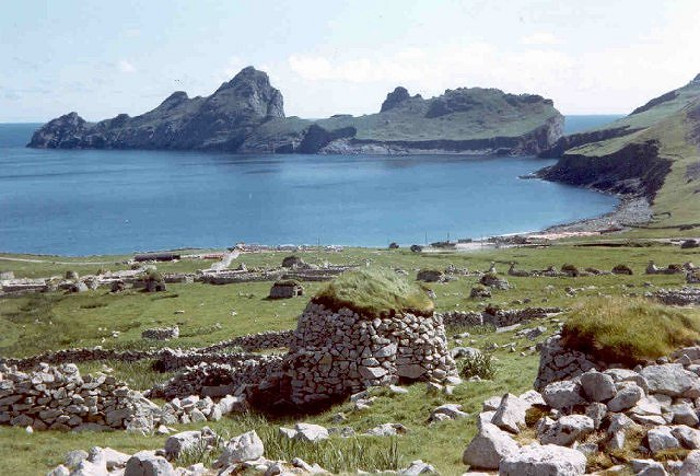280-Leaving St. Kilda
Futility Closet
Greg Ross
4.8 • 748 Ratings
🗓️ 13 January 2020
⏱️ 33 minutes
🧾️ Download transcript
Summary

1930 saw the quiet conclusion of a remarkable era. The tiny population of St. Kilda, an isolated Scottish archipelago, decided to end their thousand-year tenure as the most remote community in Britain and move to the mainland. In this week's episode of the Futility Closet podcast we'll describe the remarkable life they'd shared on the island and the reasons they chose to leave.
We'll also track a stork to Sudan and puzzle over the uses of tea trays.
Intro:
Reportedly the 3rd Earl of Darnley believed he was a teapot.
Henry Hudson's journal records a 1610 encounter with a mermaid.
Sources for our feature on St. Kilda:
Charles MacLean, Island on the Edge of the World: The Story of St Kilda, 1972.
Tom Steel, The Life and Death of St. Kilda: The Moving Story of a Vanished Island Community, 2011.
Andrew Fleming, St Kilda and the Wider World: Tales of an Iconic Island, 2005.
Alexander Buchan, A Description of St. Kilda, The Most Remote Western Isle of Scotland, 1741.
Martin Martin, A Voyage to St. Kilda, 1749.
George Seton, St Kilda Past and Present, 1878.
Alastair Gray, A History of Scotland, 1989.
John Macculloch, A Description of the Western Islands of Scotland, 1819.
Fraser MacDonald, "St Kilda and the Sublime," Ecumene 8:2 (2001), 151-174.
L.F. Powell, "The History of St. Kilda," Review of English Studies 16:61 (January 1940), 44-53.
"St. Kilda," British Medical Journal 1:2683 (June 1, 1912), 1249-1251.
"St. Kilda," British Medical Journal 2:3418 (July 10, 1926), 80-81.
Fergus McIntosh, "A Trip to St. Kilda, Scotland's Lost Utopia in the Sea," New Yorker, Dec. 3, 2017.
Alison Campsie, "New Images Throw Light on a St Kilda Fit for the 21st Century," Scotsman, Oct. 8, 2018, 24.
Roger Cox, "Deserted Streets, Sea Cliffs and Stark Military Towers Show Real St Kilda in Black and White," Scotsman, May 26, 2018, 58.
Neel Mukherjee, "A Veritable No Man's Land, Off the Coast of Scotland," New York Times, May 7, 2018.
Alison Campsie, "What It's Like Living on St Kilda," Scotsman, Feb. 21, 2018.
"'End of an Era': Last Native of Remote Island St Kilda Dies," [London] Express, April 7, 2016.
Gabriella Swerlingwrites, "St Kilda: Islands That Were Not So Remote After All," Times, Nov. 3, 2015, 5.
"Norman John Gillies: Obituaries," Daily Telegraph, Oct. 3, 2013, 35.
Steven McKenzie, "The New Residents of St Kilda Archipelago," BBC News, Aug. 29, 2010.
"Eighty Years Ago St Kilda Was Evacuated. Today One of Only Two Survivors Remembers Leaving the Islands," Scotsman, Aug. 11, 2010.
Charlie English, "St Kilda: The Edge of the World," Guardian, Aug. 28, 2009.
Nigel Johnson, "St. Kilda Tells of Lonely, Difficult Existence," Winnipeg Free Press, June 10, 2006, E.6.
Nigel Richardson, "Revisiting the Margin of the World," National Post, Aug. 21, 1999, B12.
Edmund Antrobus, "St. Kilda, the Enigma Out to Sea," [Bergen County, N.J.] Record, Aug. 15, 1999.
"Return to St Kilda," Glasgow Herald, March 18, 1987.
"Island to Be Abandoned," New York Times, July 30, 1930.
"St. Kilda," London Graphic, Nov. 14, 1885.
"St Kilda," Caledonian Mercury, Sept. 1, 1834.
"Stories from St Kilda," National Records of Scotland (accessed Dec. 29, 2019).
Listener mail:
"Polish Charity Gets Huge Phone Bill Thanks to Stork," BBC News, June 28, 2018.
"Polish Stork Vanishes From GPS but Delivers Huge Phone Bill," AP News, June 29, 2018.
Iain Thomson, "What a Flap: SIM Swiped From Slain Stork's GPS Tracker Used to Rack Up $2,700 Phone Bill," The Register, July 3, 2018.
Helena Horton, "Palmerston, the Foreign Office Cat, Returns to Work After Six Months Off for Stress," Telegraph, Dec. 2, 2019.
Megan Baynes, "Foreign Office Cat Palmerston Returns to Work After Six Months Off With Stress," London Press Association, Dec. 3, 2019.
This week's lateral thinking puzzle was contributed by listener Miriam Fewtrell, based on a fact she read in Leonard Mosley's 1974 book The Reich Marshal: A Biography of Hermann Goering.
You can listen using the player above, download this episode directly, or subscribe on Google Podcasts, on Apple Podcasts, or via the RSS feed at https://futilitycloset.libsyn.com/rss.
Please consider becoming a patron of Futility Closet -- you can choose the amount you want to pledge, and we've set up some rewards to help thank you for your support. You can also make a one-time donation on the Support Us page of the Futility Closet website.
Many thanks to Doug Ross for the music in this episode.
If you have any questions or comments you can reach us at [email protected]. Thanks for listening!
Transcript
Click on a timestamp to play from that location
| 0:00.0 | Welcome to the Futility Closet Podcast, forgotten stories from the pages of history. |
| 0:14.7 | Visit us online to sample more than 11,000 quirky curiosities from a delusional teapot to Henry Hudson's mermaid. This is episode |
| 0:22.8 | 280. I'm Greg Ross. And I'm Sharon Ross. 1930 saw the quiet conclusion of a remarkable era. |
| 0:30.5 | The tiny population of St. Kilda, an isolated Scottish archipelago, decided to end their |
| 0:35.7 | thousand-year tenure as the most remote community in |
| 0:38.1 | Britain and moved to the mainland. In today's show, we'll describe the remarkable life they'd shared |
| 0:42.9 | on the island and the reasons they chose to leave. We'll also track a stork to Sudan and puzzle over |
| 0:49.4 | the uses of tea trees. |
| 0:58.9 | This story has an end, but no beginning. |
| 1:04.4 | A hundred miles west of the Scottish mainland lie four small islands, the westernmost islands of the outer Hebrides. |
| 1:06.4 | Beyond them to the west, the North Atlantic stretches unbroken to Newfoundland. |
| 1:10.9 | Together they're known as St. Kilda. They occupy an area only about the size of Heathrow Airport, |
| 1:16.0 | but their thousand-foot cliffs are the highest in Britain and attract nearly a million |
| 1:19.8 | seabirds each year. The largest of them, Herta, was also once home to the most remote |
| 1:24.7 | community in Britain, one whose history lasted a thousand years |
| 1:28.2 | and ended on an otherwise unremarkable August day in 1930. Since the 16th century, the islands had |
| 1:34.9 | been the domain of Clan MacLeod, whose chief sent a steward each summer to collect the rent, |
| 1:39.9 | which the islanders paid in kind. So, after keeping themselves alive, the St. Kilden's main |
| 1:45.2 | occupation each year was to produce enough goods to pay the rent. To accomplish this, they had to |
| 1:50.2 | put every resource on the little island to good use, and that united them into a strong community. |
| 1:55.1 | They traded with some other islands in the Outer Hebrides, but sea travel was dangerous, |
| 1:59.2 | so most of their trade was conducted for them, |
... |
Please login to see the full transcript.
Disclaimer: The podcast and artwork embedded on this page are from Greg Ross, and are the property of its owner and not affiliated with or endorsed by Tapesearch.
Generated transcripts are the property of Greg Ross and are distributed freely under the Fair Use doctrine. Transcripts generated by Tapesearch are not guaranteed to be accurate.
Copyright © Tapesearch 2025.

